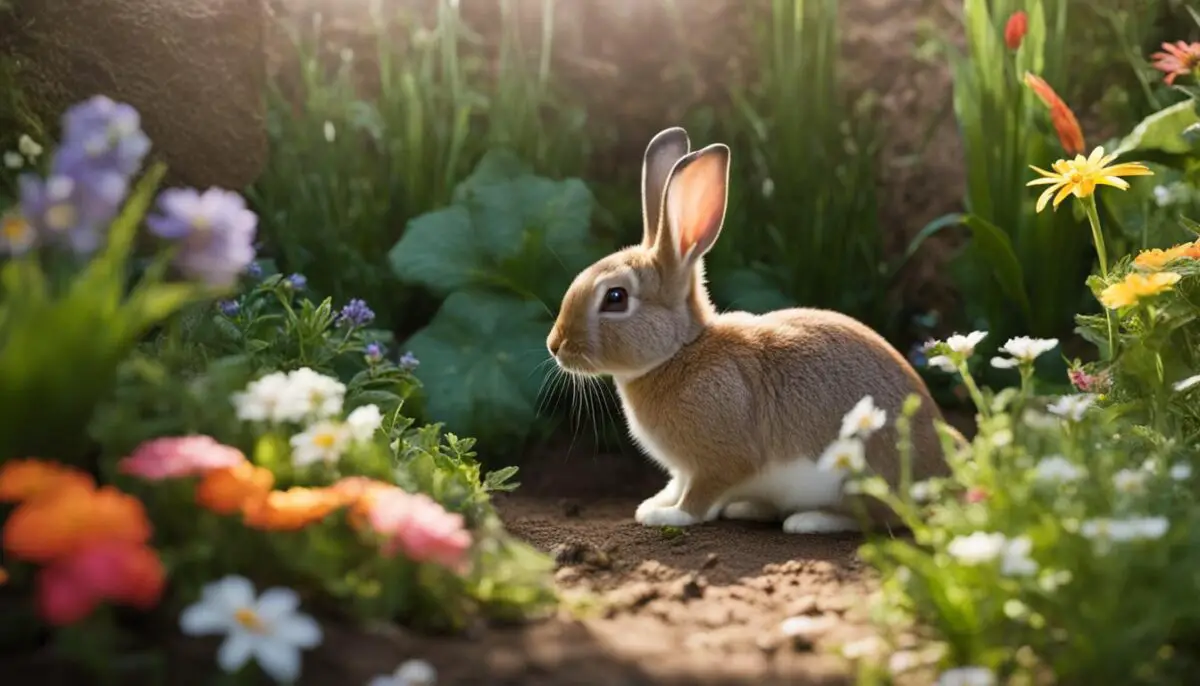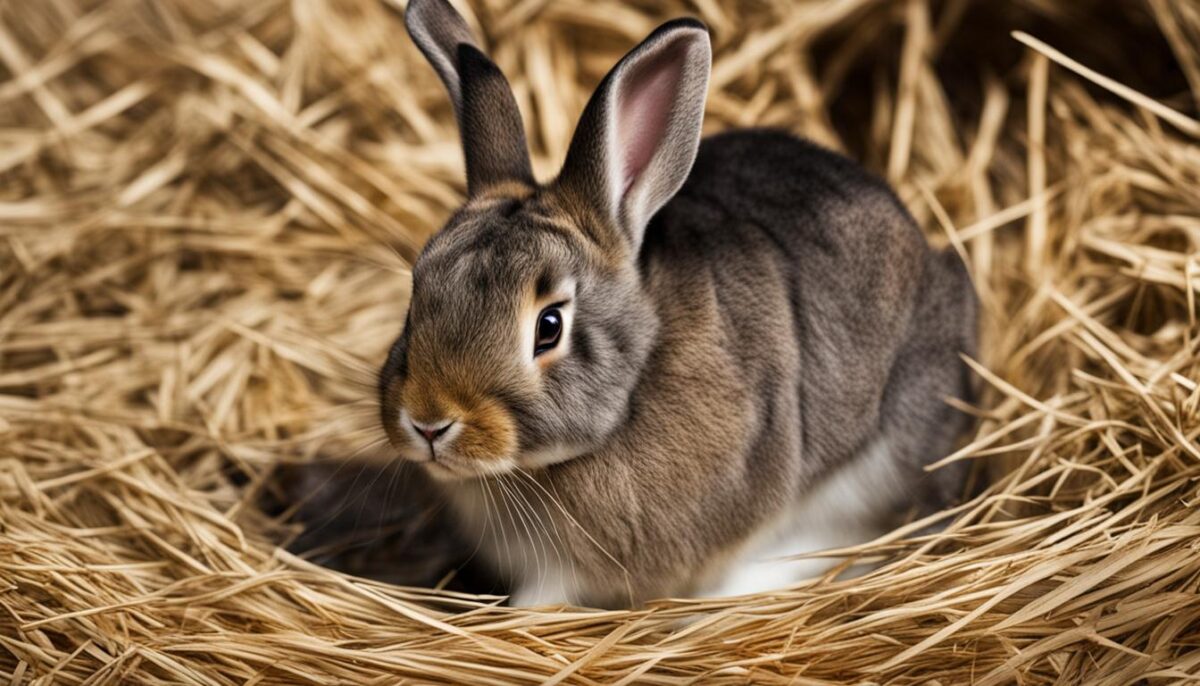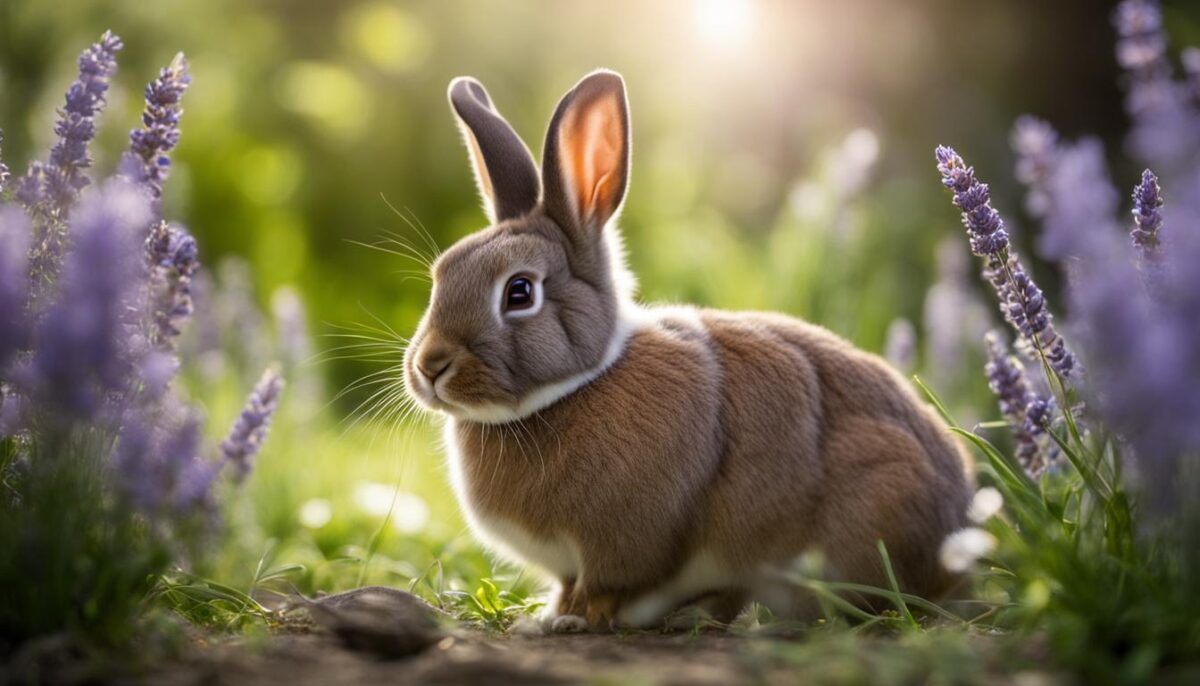Welcome to our guide on understanding and managing stress in rabbits. Rabbits are delicate creatures, easily prone to stress due to their prey animal nature. In this article, we will explore the signs of rabbit stress, the behavioral needs of rabbits, and effective strategies for preventing and managing stress. By prioritizing their well-being, you can ensure that your furry friends lead happy and stress-free lives.
Key Takeaways:
- Rabbits can experience chronic stress, which can significantly impact their health and well-being.
- Early experiences and socialization play a crucial role in a rabbit’s behavior.
- Signs of rabbit stress include nervousness, aggression, lethargy, altered feeding habits, and excessive grooming.
- Environmental and social stressors can contribute to rabbit stress.
- Providing suitable housing, enrichment, and mental stimulation can help reduce stress in rabbits.
When Rabbits Get Stressed
The Behavioral Needs of Rabbits
Rabbits have specific behavioral needs that must be addressed to ensure their well-being, especially when they are stressed. Understanding rabbit behavior when stressed is crucial in order to provide the appropriate care and support. Rabbits are prey animals by nature, which means they have a heightened sensitivity to their surroundings and can easily become frightened or agitated. This makes it important to create an environment that promotes their mental and emotional health.when rabbits get stressed
Socialization plays a vital role in meeting the behavioral needs of rabbits. From an early age, rabbits should be exposed to positive interactions with humans and other rabbits. This helps them develop confidence and adaptability to new situations. Gradual introductions to new environments, handling, and exposure to normal sights and sounds are essential. Pushing rabbits into uncomfortable situations or neglecting their social needs can lead to behavior problems and increased stress.
To calm stressed rabbits, it is important to provide them with a safe and secure environment. This means ensuring they have enough space to move around and explore, as well as suitable hiding places to retreat to when they feel anxious. Rabbits also benefit from interactive toys and enrichment activities that stimulate their natural foraging instincts. These can include puzzle feeders, tunnels, and objects for them to chew on. By meeting their behavioral needs, we can help reduce stress and promote a sense of well-being in rabbits.
| Behavioral Needs | Ways to Address Them |
|---|---|
| Socialization | Gradual introductions to people and other rabbits; positive interactions and exposure to new environments |
| Space and Shelter | Providing a spacious and secure enclosure with suitable hiding places |
| Enrichment | Interactive toys, puzzle feeders, tunnels, and objects for chewing |
| Foraging Opportunities | Access to fresh grass or hay for grazing; hiding food to stimulate natural foraging instincts |
Signs of Rabbit Stress
Rabbits, as prey animals, are prone to stress, and it’s important for owners to be able to recognize the signs and symptoms. By identifying these signs early on, necessary steps can be taken to alleviate stress and promote a healthier environment for the rabbits. Here are some common indicators that a rabbit may be experiencing stress:
- Nervous behavior: Rabbits that are stressed may appear jumpy and constantly on edge.
- Aggressive behavior when handled: If a normally docile rabbit becomes aggressive or tries to bite when picked up or handled, it could be a sign of stress.
- Lethargy and lack of interest: Stressed rabbits may show a lack of energy and enthusiasm for their usual activities.
- Altered feeding habits: A stressed rabbit may eat less or suddenly lose interest in food.
- Hiding or trying to run away: Rabbits that are stressed may seek hiding places or attempt to escape from their enclosure.
- Heavy breathing: Stress can cause rabbits to breathe heavily or pant.
- Altered toileting habits: Changes in a rabbit’s litter box behavior, such as not using it regularly or avoiding it altogether, can be a sign of stress.
- Over-grooming or lack of grooming: Stressed rabbits may excessively groom themselves or neglect their grooming altogether.
- Repetitive movements without purpose: Some rabbits may exhibit repetitive behaviors, such as pacing or circling, when they are stressed.
If any of these signs are observed in a rabbit, it is advisable to seek veterinary advice. A veterinarian can provide a proper diagnosis and recommend appropriate measures to alleviate stress and improve the rabbit’s well-being.
| Signs of Rabbit Stress | Explanation |
|---|---|
| Nervous behavior | Rabbits that are constantly on edge and easily startled may be experiencing stress. |
| Aggressive behavior when handled | If a rabbit becomes aggressive or tries to bite when picked up or handled, it could indicate underlying stress. |
| Lethargy and lack of interest | Stressed rabbits may show a lack of energy and lose interest in their usual activities. |
| Altered feeding habits | A stressed rabbit may eat less or suddenly lose interest in food altogether. |
| Hiding or trying to run away | Rabbits that seek hiding places or attempt to escape from their enclosure may be experiencing stress. |
“It’s important for rabbit owners to closely monitor their pets for signs of stress and take appropriate action to alleviate it. Recognizing these signs early on can prevent further complications and improve the overall well-being of the rabbits.” – Dr. Amanda Smith, Rabbit Veterinarian
By being attentive to the signs of stress and taking proactive measures, rabbit owners can ensure a healthier and happier life for their furry companions.
Causes of Rabbit Stress
Managing rabbit stress is vital for the overall well-being and health of these sensitive animals. By understanding the causes of stress in rabbits, owners can take proactive measures to prevent and mitigate stressful situations. Identifying and addressing these stressors can significantly contribute to a happier and healthier rabbit.
One of the primary causes of rabbit stress is environmental factors. Sudden changes to their environment, such as moving to a new location or rearranging their living space, can be stressful for rabbits. Lack of space, confinement, poor ventilation, and temperature fluctuations can also contribute to their stress levels. Additionally, the absence of access to food or water can create anxiety and discomfort for rabbits.ways to calm stressed rabbits
Social stress is another significant cause of rabbit stress. Living with too many cage mates or the loss of a companion can lead to heightened levels of stress. Rabbits are social animals and require appropriate social interactions and bonding opportunities. The absence of companionship and the inability to establish social hierarchies can result in increased stress.
Mental stress is also a significant factor in rabbit well-being. These intelligent animals need mental stimulation and enrichment to prevent boredom and mental stagnation. A lack of mental activities, such as toys, puzzles, and opportunities for exploration and foraging, can lead to stress and anxiety.understanding rabbit stress
| Causes of Rabbit Stress | Preventive Measures |
|---|---|
| Environmental factors | Ensure a stable and comfortable living environment with adequate space, proper ventilation, and temperature control. Provide access to clean water and a balanced diet. |
| Social stress | Provide appropriate social interactions and companionship for rabbits. Introduce them to compatible cage mates gradually and offer sufficient space and resources for each rabbit. |
| Mental stress | Offer a variety of mental stimulation and enrichment activities, including toys, puzzles, and opportunities for exploration and foraging. Regularly rotate and introduce new toys to prevent boredom. |
By managing these potential causes of stress, rabbit owners can create a harmonious and stress-free environment for their furry companions. Ensuring a comfortable living space, promoting social interaction, and providing mental stimulation are key elements in preventing stress and promoting the well-being of rabbits.
Housing and Enrichment for Rabbits
Creating a suitable housing environment for rabbits is essential for managing their stress levels and promoting overall well-being. Rabbits require a spacious and secure enclosure that allows them to exhibit natural behaviors such as running, jumping, and exploring. Providing hiding places, such as tunnels or boxes, can give rabbits a sense of security and help them feel safe and calm.rabbit stress symptoms
Additionally, it is important to offer enrichment opportunities to keep rabbits mentally stimulated and engaged. This can include providing a variety of toys, such as chew toys and puzzle feeders, to prevent boredom. Fresh grass or hay should be accessible for grazing, which mimics their natural foraging behavior and promotes dental health. Giving them space to dig and mark their territory can also help alleviate stress.
| Key Elements for Rabbit Housing and Enrichment |
|---|
| Spacious and secure enclosure |
| Hiding places (tunnels, boxes) |
| Various toys (chew toys, puzzle feeders) |
| Access to fresh grass or hay for grazing |
| Opportunities for digging and marking territory |
It’s important to note that rabbits are social animals and thrive with companionship. Providing them with the opportunity to interact with another rabbit can help reduce stress and loneliness. However, introductions should be done gradually and under supervision to ensure compatibility and prevent any potential conflicts.how to prevent rabbit stress
Overall, by prioritizing appropriate housing and enrichment for rabbits, owners can create a stress-free environment that promotes their well-being and happiness.
Prevention and Management of Stress
Managing stress in rabbits is essential for their overall well-being and happiness. By understanding their specific needs and implementing appropriate strategies, you can effectively prevent and alleviate stress in your furry companions.
Creating a Stress-Free Environment
One of the key ways to manage rabbit stress is by providing them with a calm and sheltered living space. Ensure that their enclosure is spacious, secure, and free from potential stressors. Avoid loud noises, extreme temperatures, and sudden changes in their environment. Additionally, maintaining proper ventilation and lighting can contribute to a stress-free environment. coping with stressed rabbits
Offering a clean and comfortable habitat is also crucial. Regularly clean their living area, provide fresh food and water, and ensure access to suitable hiding places. Proper hygiene and a clutter-free environment can go a long way in reducing stress levels.
Enrichment and Mental Stimulation
Rabbits are intelligent and curious animals, and providing them with mental stimulation is vital for their well-being. Engage them in enrichment activities such as foraging for food, offering a variety of toys, and providing companionship with other rabbits. These activities help combat boredom and keep rabbits mentally engaged, reducing their stress levels.
Regular Veterinary Check-ups
Regular veterinary check-ups are essential for monitoring your rabbit’s health and detecting any signs of stress or underlying issues. A knowledgeable veterinarian can provide guidance on managing stress and offer tailored advice based on your rabbit’s specific needs. Don’t hesitate to seek professional help if you notice any concerning behaviors or changes in your rabbit’s well-being.

| Key Tips for Managing Rabbit Stress |
|---|
| Provide a calm and sheltered living environment. |
| Engage rabbits in mental enrichment activities. |
| Maintain regular veterinary check-ups. |
| Monitor for signs of stress and seek professional advice. |
Reproductive Behavior in Rabbits
Reproductive behavior is a natural aspect of rabbit life, but it can also lead to stress and health complications for both rabbits and their owners. To minimize potential stressors and ensure the well-being of rabbits, it is advisable to consider neutering pet rabbits. Neutering, also known as spaying or castration, involves the removal of the reproductive organs. This procedure can prevent territorial disputes, aggression, and unwanted reproduction, reducing overall stress levels.
Neutering rabbits has several benefits beyond stress reduction. It can significantly decrease the risk of reproductive-related health issues, such as uterine tumors and testicular cancer. Additionally, neutering can help manage behavioral challenges associated with mating instincts, preventing unwanted behaviors like spraying and mounting. Neutered rabbits also tend to be more social and less aggressive, enhancing their overall quality of life.
Key Benefits of Neutering Rabbits:
- Reduces stress and aggression
- Prevents unwanted reproduction
- Decreases the risk of reproductive-related health issues
- Alleviates behavioral challenges associated with mating instincts
- Enhances social behavior and overall well-being
It’s important to consult with a veterinarian experienced in rabbit care to determine the appropriate timing for neutering. The procedure is typically recommended between 3 to 6 months of age for both male and female rabbits. The veterinarian will assess the rabbit’s overall health and ensure they are ready for the surgery. Post-operative care is crucial to aid in a smooth recovery, including monitoring for any signs of infection or complications.
By neutering pet rabbits, owners can help manage stress levels and promote a healthier and more harmonious environment for their furry companions. Taking proactive steps to prevent unwanted behaviors and reproductive concerns can enhance the bond between rabbits and their owners, ensuring a happier and stress-free life for all.
Maintaining a Healthy Environment for Rabbits
Creating a healthy environment for rabbits is essential in managing their stress and promoting their overall well-being. By understanding their specific needs and providing the right conditions, you can help ensure that your rabbits stay happy and stress-free.
Temperature Control and Ventilation
Proper temperature control is crucial for rabbits as they are sensitive to extreme heat and cold. Ensure that their living space is well-ventilated to prevent heat buildup and maintain a comfortable environment. Avoid placing their enclosure in direct sunlight or near drafty areas. Additionally, provide appropriate bedding and shelter to protect them from temperature fluctuations.
Lighting and Noise Reduction
Rabbits thrive in a calm and quiet environment. Avoid exposing them to excessively loud noises or sudden, jarring sounds as these can cause stress. Consider using curtains or blinds to regulate natural light and create a soothing atmosphere. A dimmer and quieter environment can help your rabbits feel safe and secure.
Clean and Spacious Living Area
Regular cleaning of your rabbits’ living area is essential to maintain a hygienic environment. Remove waste, replace soiled bedding, and provide fresh water and food daily. Rabbits also need adequate space to move around and exercise. Ensure that their enclosure is spacious enough for them to hop, stretch, and explore comfortably.
| Environmental Factors | Stress Reduction Tips |
|---|---|
| Sudden changes in the environment | Gradually introduce new elements or changes and provide hiding spots for your rabbits to feel secure. |
| Lack of mental stimulation | Provide toys, tunnels, and safe objects for your rabbits to interact with and keep their minds engaged. |
| Confinement or lack of space | Ensure your rabbits have enough room to move around and explore comfortably. |
| Poor ventilation | Keep their living area well-ventilated to prevent heat buildup and maintain fresh air circulation. |
| Lack of access to food or water | Provide a constant supply of fresh water and appropriate food to meet their nutritional needs. |
By focusing on maintaining a healthy environment for your rabbits, you can help reduce their stress levels and ensure their overall well-being. Paying attention to temperature control, lighting, noise reduction, cleanliness, and providing adequate space will contribute to creating a stress-free and comfortable living space for your furry friends.

Example of a Table:
| Signs of Rabbit Stress | Description |
|---|---|
| Excessive Nervousness | Rabbits may constantly appear on edge, jump at the slightest noise, or be overly watchful. |
| Restlessness | Rabbits may exhibit constant movement and appear unable to settle down. |
| Aggression when Handled | Rabbits may display aggression, such as biting or scratching, when being handled due to fear or discomfort. |
| Lethargy | Rabbits may show a lack of energy or enthusiasm, appearing tired and uninterested in their surroundings. |
| Changes in Eating Habits | Rabbits may have a decrease or increase in appetite, or exhibit picky eating behaviors. |
| Excessive Grooming or Lack of Grooming | Rabbits may engage in excessive grooming, leading to bald patches or skin irritation. Alternatively, they may neglect grooming altogether, resulting in a messy or unkempt appearance. |
Enrichment and Mental Stimulation for Rabbits
Managing rabbit stress is crucial for their overall well-being. Providing regular mental stimulation and enrichment activities can help keep rabbits calm and engaged. Here are some effective ways to provide enrichment for stressed rabbits:
- Foraging for food: Hide small portions of their daily food in different areas of their enclosure or use puzzle feeders to encourage natural foraging behaviors.
- Offer a variety of toys: Provide a range of toys like chew toys, tunnels, and balls to keep rabbits mentally stimulated and entertained. Rotate the toys regularly to maintain their interest.
- Companionship with other rabbits: If possible, consider giving your rabbit a companion. Rabbits are social animals and having a bonded partner can help reduce stress and loneliness.
- Playtime outside the enclosure: Allow supervised playtime outside of the enclosure in a safe and rabbit-proofed area. This will give them the opportunity to explore new surroundings and interact with different objects.
Remember, mental stimulation is just as important as physical exercise for rabbits. Providing a stimulating environment can help prevent and alleviate stress, improving their overall quality of life.
Enrichment and mental stimulation can vary based on individual rabbits’ preferences. Be observant and note which activities your rabbit enjoys the most. Rotate and introduce new enrichment options regularly to keep them engaged and prevent boredom.
Benefits of Enrichment for Stressed Rabbits
| Benefits | Description |
|---|---|
| Reduced stress | Enrichment activities provide mental stimulation that can keep rabbits occupied and distract them from potential stressors. |
| Prevention of destructive behaviors | Engaging rabbits in play and exploration can redirect their energy towards positive activities, reducing the likelihood of destructive behaviors like chewing on furniture or digging in unwanted areas. |
| Improved physical health | Some enrichment activities, such as obstacle courses and tunnels, can encourage physical exercise and help maintain a healthy weight for rabbits. |
| Enhanced cognitive abilities | Enrichment challenges rabbits’ problem-solving skills, improving their cognitive abilities and overall mental well-being. |
By implementing these enrichment strategies, you can provide a stimulating and stress-free environment for your rabbits, promoting their physical and mental health.
Social Interactions and Bonding for Rabbits
Appropriate social interactions and bonding opportunities are essential for managing rabbit stress and ensuring their overall well-being. Rabbits are social animals by nature and thrive when they have companionship and the opportunity to engage in social behaviors.
When introducing rabbits to each other, it’s crucial to do so gradually and in a controlled environment. This allows them to establish a hierarchy and get acquainted without feeling overwhelmed or threatened. Providing ample space for interaction and retreat is essential, as it allows rabbits to have their personal space and reduces the chances of conflicts or stress.
Supervised inter-species interactions with other pets should be approached with caution, as rabbits may perceive them as potential threats. It’s important to carefully monitor these interactions and ensure the safety and well-being of all animals involved.
Creating a harmonious social environment for rabbits helps alleviate stress and allows them to express their natural behaviors. It promotes mental stimulation, reduces boredom, and contributes to their overall happiness and quality of life.
Bonding Tips:
- Introduce rabbits gradually, allowing them to sniff and observe each other through a barrier before direct contact.
- Provide multiple hideouts and hiding places to ensure each rabbit has a space to retreat to when needed.
- Supervise interactions and intervene if any signs of aggression or stress are observed.
- Offer treats and positive reinforcement during bonding sessions to create positive associations.
- Seek guidance from a rabbit-savvy veterinarian or animal behaviorist if you encounter any challenges or concerns during the bonding process.

| Benefits of Social Interactions and Bonding for Rabbits | Effective Bonding Techniques |
|---|---|
| Rabbits feel more secure and less stressed when they have a companion. | Gradual introductions and supervised interactions. |
| Social interactions provide mental stimulation and prevent boredom. | Providing multiple hiding spots and personal spaces for each rabbit. |
| Bonded rabbits groom each other, which strengthens their bond and promotes emotional well-being. | Using positive reinforcement and treats during bonding sessions. |
| Bonding reduces the risk of behavioral issues such as aggression or destructive behavior due to stress. | Seeking guidance from experts if difficulties arise during the bonding process. |
Conclusion
In conclusion, managing rabbit stress is essential for the overall well-being of these sensitive creatures. By understanding the specific needs and behaviors of rabbits, owners can take proactive steps to prevent and alleviate stress.
Recognizing the signs of stress, such as nervousness, aggression, and changes in eating habits, is crucial in order to address the issue promptly. Providing appropriate housing, enrichment, and social interactions can significantly reduce stress levels in rabbits.
Regular veterinary check-ups and seeking expert advice when needed are important for managing rabbit stress effectively. By creating a healthy environment, offering mental stimulation, and prioritizing their physical and mental health, owners can ensure that rabbits live happy and stress-free lives.
FAQ
What are the signs of stress in rabbits?
The signs of stress in rabbits can include nervousness, aggression, lethargy, altered feeding habits, excessive grooming, and changes in behavior.
What can cause stress in rabbits?
Stress in rabbits can be caused by sudden changes to their environment, lack of space, confinement, poor ventilation, temperature fluctuations, lack of access to food or water, social stress from living with too many cage mates or the loss of a companion, and mental stress due to boredom and lack of mental stimulation.
How can I prevent and manage stress in rabbits?
To prevent and manage stress in rabbits, it’s important to provide adequate housing and enrichment, recognize signs of stress, gradually introduce them to new environments and handling, provide mental stimulation and physical exercise, ensure a quiet and sheltered living space, seek veterinary advice when needed, and consider neutering to minimize potential stress and health complications.
How can I create a healthy environment for my rabbits?
Creating a healthy environment for rabbits involves considerations such as temperature control, proper lighting, and ventilation. Providing a clean and spacious living area, access to fresh food and water, regular grooming, and avoiding exposure to extreme stimuli like heat waves or loud noises are crucial.
How can I recognize stress in rabbits?
Signs of stress in rabbits can include excessive nervousness, restlessness, aggression, lethargy, changes in eating habits, excessive grooming, and changes in behavior. It’s important to be observant and monitor their behavior regularly.
How can I provide mental stimulation for my rabbits?
To provide mental stimulation for rabbits, you can offer foraging activities, a variety of toys and objects for play, companionship with other rabbits, and supervised inter-species interactions with caution.
How can I help my rabbits with social interactions and bonding?
Gradually introducing rabbits to each other, providing ample space for interaction and retreat, and supervising inter-species interactions with other pets can help reduce social stress and promote bonding.


